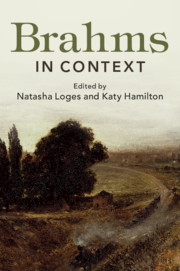Book contents
- Brahms in Context
- Brahms in Context
- Copyright page
- Dedication
- Contents
- Illustrations
- Music Examples
- Notes on Contributors
- Preface
- Abbreviations
- Part I Personality, People and Places
- Part II Identities, Environments and Influences
- Part III Performance and Publishing
- Part IV Society and Culture
- Chapter 26 Politics and Religion
- Chapter 27 Literature
- Chapter 28 Philosophy
- Chapter 29 Visual Arts
- Chapter 30 Science and Technology
- Part V Reception and Legacy
- Further Reading
- Index
- References
Chapter 28 - Philosophy
from Part IV - Society and Culture
Published online by Cambridge University Press: 15 May 2019
- Brahms in Context
- Brahms in Context
- Copyright page
- Dedication
- Contents
- Illustrations
- Music Examples
- Notes on Contributors
- Preface
- Abbreviations
- Part I Personality, People and Places
- Part II Identities, Environments and Influences
- Part III Performance and Publishing
- Part IV Society and Culture
- Chapter 26 Politics and Religion
- Chapter 27 Literature
- Chapter 28 Philosophy
- Chapter 29 Visual Arts
- Chapter 30 Science and Technology
- Part V Reception and Legacy
- Further Reading
- Index
- References
Summary
The compositional output of Johannes Brahms contains a wealth of lieder and choral works that attest to the composer’s intense engagement with literature and the Bible. Brahms was an avid reader, deeply engaged with the literature of his own time and that of the past. He was also strongly preoccupied with philosophy. Literary figures often provide a much more complex and rich account of the human condition than many of the ideologies of philosophy that dominated the nineteenth century. For instance, we find the philosophical ideologies of Kant and Hegel filtered through the writings of figures such as Hölderlin, Goethe and Schiller. Brahms was aware of this, which is evident in his compositional output in several ways.
The composer’s broad intellectual curiosity was often concerned with philosophical issues. From an early age and throughout his life, he read widely and kept a log of proverbs and philosophical sayings that were significant to him.
- Type
- Chapter
- Information
- Brahms in Context , pp. 277 - 285Publisher: Cambridge University PressPrint publication year: 2019

